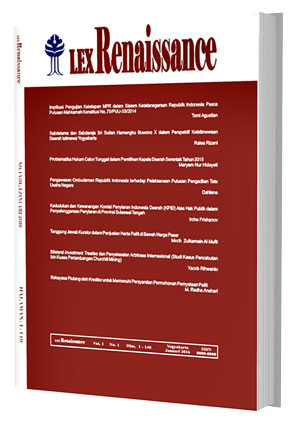Main Article Content
Abstract
Abstract
When a perpetrator of cybercrime is examined for a case settlement, the Criminal Procedure Code (KUHAP) has not clearly regulated the arrangement of electronic evidence as valid proof of evidence. What is the legality of electronic evidence in the criminal justice system? To answer this question, the researcher examined the subject matter using a normative juridical approach by analyzing the problem from the perspective of or according to existing regulations or laws, papers, articles, literature, and research findings as well as other scientific works related to this study. The Criminal Procedure Code has not explicitly regulated valid electronic evidence, which is related to the principle of legality in Law No. 11 of 2008 on Electronic Information and Transactions Article 54 Paragraph (1); therefore, electronic data can be used as valid evidence. The legality of electronic evidence is also stated in Electronic Information and Transactions Law in Chapter III about Information, Documents, and Electronic Signatures as well as the explanations of Article 44 and Article 5 of Electronic Information and Transactions Law. Referring to the stipulation as regards proof of evidence in the Criminal Procedure Code, a testing instrument must be available for electronic evidence to be declared valid at the trial, which is the same as other evidence that includes formal requirements and material requirements.
Keywords: Legality; criminal justice systemp; electronic evidence
Abstrak
Ketika seorang pelaku kejahatan teknologi diperiksa dalam hal penyelesaian perkara, KUHAP belum mengatur secara jelas mengenai pengaturan alat bukti elektornik sebagai alat bukti yang sah dalam melakukan pembuktian. Lalu bagaimana legalitas alat bukti elektronik dalam sistem peradilan pidana? Untuk menjawab pertanyaan tersebut, maka peneliti mengkaji pokok permasalahan melalui pendekatan yuridis normatif, yaitu menganalisis permasalahan dari sudut pandang atau menurut ketentuan atau peraturan perundang-undangan yang berlaku, makalah, artikel, literatur, serta hasil penelitian dan karya ilmiah lainnya yang berhubungan dengan penelitian ini. KUHAP belum mengatur secara tegas mengenai alat bukti elektronik yang sah, hal ini berkaitan dengan adanya asas legalitas yang menyatakan bahwa UU No. 11 Tahun 2008 tentang ITE dalam Pasal 54 ayat (1), maka untuk menggunakan data elektronik dapat dijadikan sebagai alat bukti yang sah. Serta legalitas alat bukti elektronik dalam UU ITE dalam Bab III tentang Informasi, Dokumen, dan Tanda Tangan Elektronik, serta penjelasan dalam Pasal 44 dan Pasal 5 UU ITE. Mengacu pada ketentuan pembuktian yang diatur dalam KUHAP, harus ada alat penguji terhadap alat bukti elektronik agar alat bukti tersebut dapat dinyatakan sah di persidangan, sama seperti terhadap alat bukti lainnya, yaitu persyaratan formil dan persyaratan materiil.
Kata-kata Kunci: Legalitas; sistem peradilan pidana; alat bukti elektronik
Article Details
Authors who publish with this journal agree to the following terms:
a. Authors retain copyright and grant the journal right of first publication with the work simultaneously licensed under a Creative Commons Attribution License that allows others to share the work with an acknowledgement of the work's authorship and initial publication in this journal.
b. Authors are able to enter into separate, additional contractual arrangements for the non-exclusive distribution of the journal's published version of the work (e.g., post it to an institutional repository or publish it in a book), with an acknowledgement of its initial publication in this journal.
c. Authors are permitted and encouraged to post their work online (e.g., in institutional repositories or on their website) prior to and during the submission process, as it can lead to productive exchanges, as well as earlier and greater citation of published work (See The Effect of Open Access).



